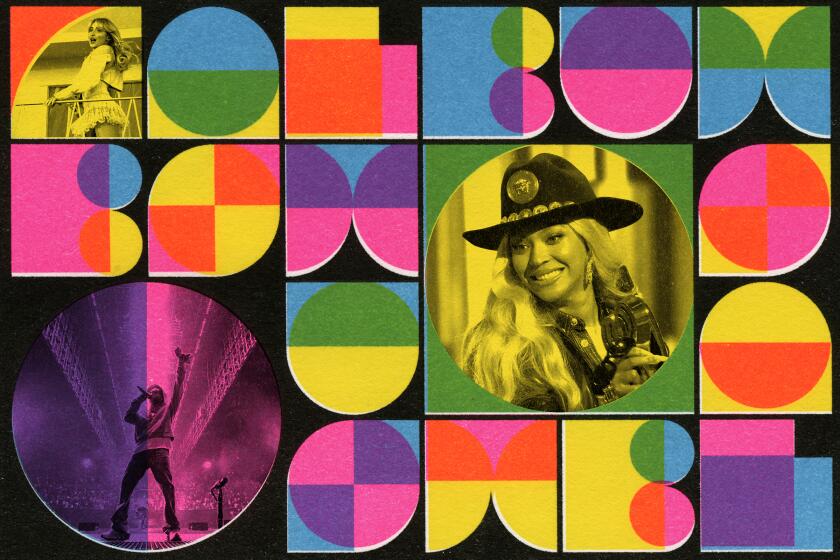Savages talk about love on the London band’s terms as ‘Adore Life’ set to land

- Share via
Savages is an intense band. Lead singer Jehnny Beth will use that description herself multiple times over a series of interviews.
She has a point. The sound: Guitar-based tension at its most concentrated. Consider it the aural equivalent of a clenched fist. This, after all, is the image that graces the cover of the band’s second album, “Adore Life,” scheduled for release on Jan. 22 from Matador Records.
The look: all black. The London-based band doesn’t deviate from this uniform, even when the temperature in L.A. was pushing 90 degrees in late August. Even then, leather jackets and dark blazers were not considered optional.
See more of Entertainment’s top stories on Facebook >>

Savages will release a new album, “Adore Life,” on Jan. 22.
Pose a query to the band, and Savages will answer, but Beth will let you know when it’s time to move on. “Next question,” she’ll say. And should an interview drift into overly familiar territory, such as the members’ pre-Savages life, bassist Ayse Hassan will wave it off. “It has been documented online,” she’ll say.
So forgive perhaps the unsuspecting waitress at the bright Café Gratitude, a vegetarian restaurant that begins each meal with a lighthearted question of the day. Today’s question: “If you could have any superpower, what would it be?” There’s a brief moment of silence, but Savages will not be thrown off course. The band, after all, has a worldview, and is nothing if not consistent.
The drummer speaks first. “I want the power to make people progressive, to make them care about the world around them,” Fay Milton says.
Beth doesn’t miss a beat. “Yes,” she says. “The power of consciousness.” Everyone nods in agreement. Next question.
In music and in person, Savages doesn’t say more than is necessary. The act’s debut album, 2013’s “Silence Yourself,” was a tightly wound affair that dealt with different shades of confrontation and helped catapult Savages toward the top of festival bills like Coachella, where the band is scheduled to perform in April. Winner of Britain’s prestigious Mercury Prize, “Silence Yourself” captured characters on the brink — of passion, of life and simply the ability to feel.
The follow-up is a sunnier affair, at least from a lyrical standpoint. Beth will say that some of the album is “naive.”
On “Adore Life,” the band is preoccupied with love, but it isn’t an obsession that eases Savages’ sonic assertiveness. The guitars are sharp and angled, and the rhythms fasten around the verses as if they’re a noose. Beth approaches the songs like a narrator. “I’m not going to hurt you,” she sings on the new album, “‘cuz I’m flirting with you.” Yes, in the aggressive framework Savages provide, she has to spell it out.
But spend time with Savages, and the fascination with love on “Adore Life” starts to make sense. The members are even quite funny. They’ll joke with a waitress, and then spend two minutes after she’s left the table worrying if they’ve accidentally offended her. Savages members may be intense, but they’re forces of positivity. Honest.
“When you see hard-core gigs, where you have meanness and confrontation, I think that’s an expression of love as well,” Beth says by way of explanation. “It’s a release. It’s a release of energy. Any kind of release of energy is a positive thing. It’s exciting.”
A hard subject
Beth, however, wasn’t very positive when she looked at the first batch of songs for what would ultimately become “Adore Life.” The French-born artist, who was an actress in her native country before turning to music, was nervous they were trite, superficial. Does the world really need another artist singing about love?
“It’s an easy subject, maybe?” she says. “But for me it was a hard subject because of that. It’s so used. On the first record it was intentional not to write love songs.”
Almost three years after its release, the band’s debut, “Silence Yourself,” still feels like a call to arms. As much as the band’s post-punk references may have been pronounced at times (see Wire, Gang of Four), the album’s vigor was all modern, all Savages. A sense of time and place was distorted, as songs would close in on themselves then rip open and disintegrate. Songs could be frighteningly spacious and ambient, but a threat of violence, in the form of Gemma Thompson’s out-of-nowhere guitar, was always around the corner.
When Beth reflects back on the work, she says it was born of a desire to be “a part of something bigger than ourselves,” and her band mates agree. Just listen to Milton talk about her rhythmic approach on the taking-my-life-back maelstrom that is “She Will.”
“When we play ‘She Will,’ I have to hit the cymbal over and over again super hard,” Milton explains. “To get the energy to do that — to do it really truthfully for every show — I often imagine a scenario in my head. What am I playing this for?
“Often, I think about all the women in the audience, and this is going to sound dark, but in a large crowd there will be quite a large number of women who will have been raped or sexually assaulted. I imagine that in my head. I’m playing it to beat the … out of whoever did that to them.”
There’s that intensity again. When it’s suggested that perhaps Milton make life easier on herself by, say, thinking about when rent is due instead, she breaks out in laughter. “No!” she shouts. “You cannot do that. Then it’s not real.”
Vulnerable strength
Nothing, says Beth, is more real than vulnerability. Vulnerability is at the core of “Adore Life,” but there are no heart-on-sleeves confessionals or breakup anthems here, just open-wounded songs in which guilt, jealousy and societal conventions get all mixed up in affairs of the heart.
“Adore Life,” says Beth, was about allowing the band “to be vulnerable, to put something out in the world that you don’t have all the answers about. I think there’s a strength into that.”

The song “Adore” is as close as anything in the Savages catalog to a ballad, and for a brief moment Thompson’s distorted guitar leads the song into a slow dance. “Is it human,” Beth sings, “to adore life?” Is it OK, in other words, in this mixed-up mess of a world to simply feel bliss?
“When you do something for yourself or your pleasure, you have to deal with all the opposite feelings. The song is about embracing that and getting rid of the guilt,” Beth says. “My whole family is Catholic. Not really my parents but my whole family. The sense of guilt in that religion is very strong. I was raised with the idea that you can’t enjoy yourself too much, and if you do, you have to give it back. Restraint is an interesting thing. It shapes your personality.”
“Adore Life” views love — and our approach to it — as a force that guides every decision we make. The urgent gallop of “Evil” deals with familial pressures while “Sad Person” wonders if the quest for affection isn’t a mood-altering addiction. Beth lets her voice crack, Milton’s drums rattle the walls and Thompson’s guitar streaks around the song like a jet struggling to pull out of a spin.

Savages on “Adore Life” look at matters of the heart.
Viewed as a whole, it’s a work about seizing control, of harnessing our emotions rather than letting them tear us apart. “When in Love” examines the line between loneliness and companionship. “You say you want love, but what kind of love?,” Beth shouts.
She’s asked if the line is key to understanding “Adore Life.”
“Everybody wants love, but not everybody knows what it means,” she says after a moment. “Love is not something that falls from the sky.
“I’m a firm believer that love is something you build. Love is something you do. Love is an action. There is not a moment where love is just going to come from above and solve all your problems. That will never happen. So you have to accept that there’s never a moment in life where you can rest. Happiness is in always being one foot ahead of yourself, always thinking of what’s coming next.”
“You have to be active in everything that you do. That’s how love exists,” she says. “If you’re waiting for love to happen without being active about it, it’s not going to happen. That’s what I believe. So when you say you want love, what kind of love? You need to ask yourself that question in order to have it.
“Love,” she says one more time for emphasis, “is an action.”
More to Read
The biggest entertainment stories
Get our big stories about Hollywood, film, television, music, arts, culture and more right in your inbox as soon as they publish.
You may occasionally receive promotional content from the Los Angeles Times.











